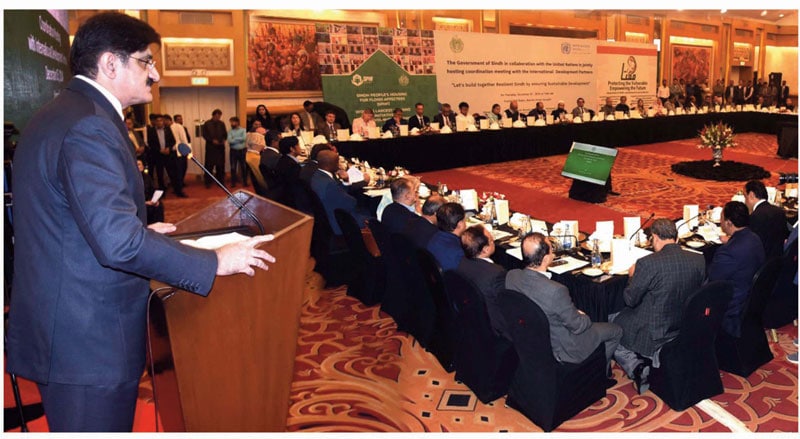Sindh Chief Minister Syed Murad Ali Shah has called for strengthened collaboration between local and international stakeholders to overcome the province’s complex challenges and pave the way for inclusive, sustainable development. The Sindh government, in partnership with the United Nations, hosted a strategic dialogue at a local hotel, bringing together international development partners, ambassadors, UN representatives, provincial ministers, advisors, and senior officials. Sindh Planning and Development Minister Syed Nasir Shah hosted the event, with Chief Secretary Asif Hyder Shah and Planning and Development Chairman Najam Shah also in attendance.
Chief Minister highlighted the critical need to address Sindh’s socioeconomic inequalities and environmental vulnerabilities, exacerbated by disasters such as the catastrophic 2022 floods, which submerged 70% of the province and displaced millions. “Sindh faces immense challenges, but the opportunities for growth and development are equally vast,” Shah remarked.
“By combining local expertise with international support, we can create a province that is resilient, inclusive, and thriving.” Shah outlined his administration’s key priorities, including: Enhancing governance and transparency. Rehabilitating vital infrastructure. Mobilizing resources for job creation and community empowerment. Strengthening climate resilience and disaster management systems. He thanked development partners for their ongoing support and emphasized the need to align efforts to achieve shared goals.
Planning and Development Minister Nisar Shah and Chairman Najam Shah delivered presentations on Sindh’s vulnerability to climate change. The province has endured four major floods since 2010, with the 2022 floods alone impacting over 12.36 million people and causing $11.57 billion in damages.
The Chief Minister emphasized critical areas for investment, including: Climate-resilient housing for 2.1 million flood-affected families. Restoration of 799 water supply schemes and 444 drainage projects. Education reforms to address the needs of 5.6 million out-of-school children. Agriculture improvements, including advanced crop varieties and water reservoirs. Expansion of renewable energy projects in solar, wind, and waste-to-energy sectors. Sindh’s Climate Change Policy 2022, Shah noted, provides a framework for addressing these challenges, but significant funding gaps remain. International development partners have pledged $5.67 billion, including $861 million in grants, to support 57 projects in health, education, and infrastructure.
Locally, the Sindh government has introduced interest-free loans for small businesses, empowering 16,000 entrepreneurs across 12 districts. Shah also emphasized scaling up vocational training, improving public services, and forging partnerships for impactful and scalable initiatives.










